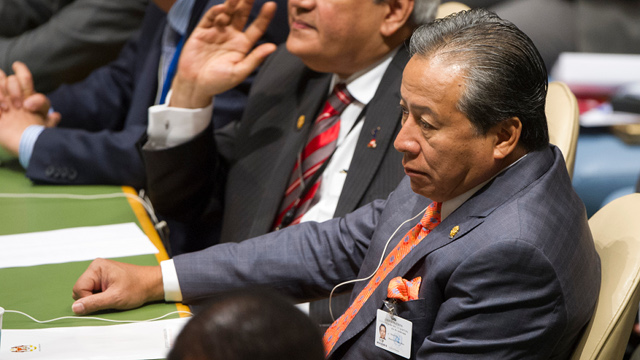SUMMARY
This is AI generated summarization, which may have errors. For context, always refer to the full article.
UNITED NATIONS – Malaysia won a highly coveted seat at the United Nations Security Council.
The Southeast Asian nation was among 5 countries that got elected to the UN body in charge of global peace and security.
But how exactly do countries become part of this powerful group?
Ayee Macaraig tells us it takes some “swag” to join this exclusive club.

What does it take to win a seat at one of the most powerful and exclusive groups in global diplomacy?
To be a member of the UN Security Council, it takes the vote of at least 129 countries, the support of your region, and goodies.
Swag bags greet diplomats at the UN General Assembly in a last-minute attempt to get their votes for 5 seats at the 15-member Council.
After years of campaigning, receptions, and diplomatic horse-trading, the 5 countries that will join the Council in January are Malaysia, Angola, Venezuela, New Zealand and Spain.
Turkey loses to Spain and New Zealand in the race for only two seats for Western European and Other States, as voting is done to ensure geographic representation.
The 5 countries win 2-year terms that will begin in 2015.
Malaysia is representing Asia in the body in charge of peace and security.
Kuala Lumpur ran unopposed, highlighting its role as a facilitator in the peace process between the Philippines and the Moro Islamic Liberation Front.
ANIFAH AMAN, FOREIGN MINISTER, MALAYSIA: Malaysia aims to among others continue advocating the vision for peace and moderation, promote mediation as an approach to a peaceful conflict resolution, promote the enhancement of peacekeeping operations.
The 5 countries will replace outgoing members South Korea, Australia, Rwanda, Argentina and Luxembourg.
But the real power lies with the 5 permanent members that get to veto resolutions – Britain, China, France, Russia and the US.
As the voting gets underway, UN Secretary-General Ban Ki-Moon reminds them of a major challenge on the Council’s agenda.
BAN KI-MOON, UN SECRETARY-GENERAL: Ebola is a huge and urgent global problem that demands a huge and urgent global response. Now I believe it is time that those other countries who really have capacity, they will provide financial support and other logistical support.
Ebola is just one of the many crises the Council has on its plate.
There’s terrorism and ISIS, the Ukraine crisis, peacekeepers under siege, Gaza and the Israeli-Palestinian conflict.
But for now, the winners are relishing their victory and prestige after what has become an expensive popularity contest for what’s supposed to be a serious and challenging job.
Ayee Macaraig, Rappler, United Nations.
– Rappler.com
Add a comment
How does this make you feel?
There are no comments yet. Add your comment to start the conversation.